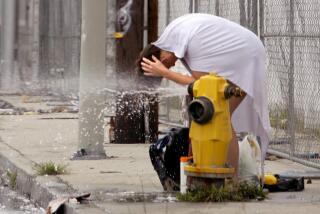Nurse Makes House Calls and Provides a Safety Net for Poor
- Share via
Mary Mason patrols the front line in Los Angeles County’s battle against contagious disease.
A public health nurse, Mason monitors an area of 100,000 people living in Sylmar, Pacoima and Sun Valley.
Day after day she marches past pit bulls into ramshackle garages, homes and trailers packed with multiple families, most of them poor, most of them uninsured, many of whom don’t speak English.
The diseases she sees most often are food-borne illnesses, tuberculosis, sexually transmitted diseases and hepatitis. She occasionally has encountered meningitis and whooping cough, and has even had a few cases of Hansen’s disease--more commonly known as leprosy.
Mason preaches the public health gospel in an area where most of the residents are foreign born, reminding people to wash their hands after they use the toilet and urging them to get ongoing care. That can be the biggest challenge.
“There is a lot of fear and mistrust,” said the earthy blue-eyed grandmother who grew up between Sylmar and San Fernando. “A lot of people are new to this country and they are pretty unsophisticated.”
According to the 1998 U.S. United Way census data, more than 80% of Pacoima’s population is Latino, and a majority of residents--53.4%--were foreign born.
On a recent day, her first stop was a follow-up to a case of shigella--an intestinal disease common to Third World countries, which was identified by researchers as more concentrated in the northeast Valley than any other area of Los Angeles County.
She recalled the environment in which she discovered the stricken young boy. When she arrived, the child had recovered from his diarrhea and was up and playing, but the house was a breeding ground for diseases with three mothers and a half dozen young children living in foul conditions.
“Man, did that place have needs,” she recalled. “It was like a semi-flophouse with 14 people in there. It was a mundane house call, but it was a filthy house with one bathroom and a yard that was god-awful to play in. I decided that what they needed was to get out of that house.”
The young woman and her child eventually got a place of their own in Palmdale.
*
On this day, Mason checks the two families that remain, reminding a young mother to keep the door of an abandoned refrigerator closed so children can’t climb inside. Ducks wander around the frontyard, where children play barefoot in the dirt.
Mason showers the mother with health advice, uttering “Cuidado, cuidado” (“be careful”), as she walks past old engines, mattresses with exposed springs, and duck droppings.
Her second stop is an elderly tuberculosis patient who is no longer contagious. The disease spreads in small, enclosed areas, and she checked the man, his wife, their nine children who live nearby, and their grandchildren.
The patient is out, but his wife is in. She is not Mason’s patient, but Mason listens to her woes. She has cancer and is getting radiation treatment. The day before, a housing inspector came and took away her stove because of an illegal gas connection.
The woman begins to cry.
Mason offers words of comfort.
“I’m pretty wigged about it,” she said later of the overwhelming needs she encounters on her job. “How important it is for me to be part of the health and safety net for these people.”
More to Read
Sign up for Essential California
The most important California stories and recommendations in your inbox every morning.
You may occasionally receive promotional content from the Los Angeles Times.













